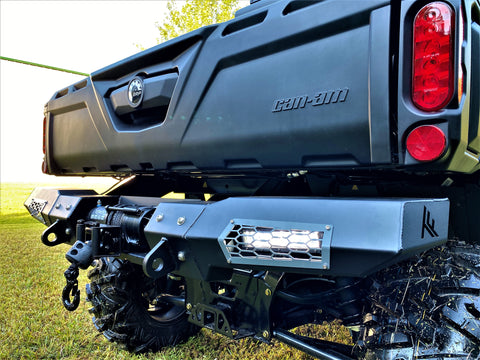If you own a utility terrain vehicle (UTV), you may wonder if driving on the road is legal. The answer to this question depends on your state's laws. Driving a UTV on the road is usually permitted, but some restrictions apply. This article will discuss how to make your UTV street legal.
What Is A Street Legal UTV
A street-legal UTV is a vehicle that can be driven on any road in the state than a U.S. highway. If it is an off-highway vehicle, which means it is not street-legal, it can only be driven on off-road trails or other designated areas.
While street-legal UTVs are becoming more popular, they are still subject to the same rules and regulations as any other street-legal vehicle. This includes having insurance, registration, and a valid driver's license. In addition, street-legal UTVs must also meet all state and federal emissions standards.

Benefits Of Having A Street-Legal UTV
There are many benefits to having a street-legal UTV. First, street-legal UTVs allow you to enjoy off-roading without trailing your vehicle to and from the trails. Secondly, street-legal UTVs will enable you to access off-road trails that are typically only accessible to off-road vehicles.
Thirdly, street-legal UTVs allow you to travel between private property and public land easily. In addition, street-legal UTVs can be registered and insured like any other vehicle. Finally, street-legal UTVs can provide a unique and enjoyable driving experience.
Whether you want to enjoy the benefits of off-roading without having to trailer your vehicle or you want to access off-road trails that are typically only accessible to off-road vehicles, owning a street-legal UTV can be a great option.
How To Make Your UTV Street-Legal
Depending on the state you live in, the process of making your UTV street legal can vary. In some states, all you need to do is register your vehicle and get it insured. Others have more stringent requirements, such as having a license plate and adhering to specific size and noise restrictions.
Still, there are a few general steps that all UTV owners should take if they want to make their vehicles street-legal. Firstly, check the local laws in your state to see what is required. Next, obtain any necessary permits or licenses.
Finally, ensure your UTV is properly equipped for use on public roads, with features such as turn signals and brake lights. By following these steps, you can ensure that you are operating within the law and keeping yourself safe while driving on public roads.
The Necessary Components Of A Street-Legal UTV
As the popularity of UTVs continues to grow, more and more drivers are taking their vehicles out on the road. If you are planning on doing the same, there are a few things you need to keep in mind.
First, all UTVs must be street-legal to be driven on public roads. This typically requires adding turn signals, brake lights, and other safety features to your vehicle. You will also need to ensure your UTV is properly registered and insured.
In addition, it is essential to obey all traffic laws when driving your UTV on the road. Just because your vehicle is smaller does not mean you can speed or run stop signs. Lastly, be aware of your surroundings and yield to other vehicles when necessary. Following these tips ensures a safe and enjoyable experience when driving your street-legal UTV on the road.

Accessories For Making Your UTV More Road-Friendly
If you frequently take your UTV out on the road, a few essential accessories can help make the experience more enjoyable. First, a windshield can help to deflect wind and debris, making it easier to see and stay comfortable while driving.
A set of off-road lights can also be helpful, allowing you to see and be seen in low-light conditions. Also, mud flaps can help keep your UTV clean by preventing mud and other materials from being flung onto the vehicle.
By outfitting your UTV with these key accessories, you can make it more road-friendly and enjoy a safer, more comfortable driving experience on paved surfaces.
States Where UTVs Are Street-Legal
While many states allow UTVs on controlled-access highways, there are only a handful of states where UTV street is legal. In these states, drivers are allowed to operate their vehicles on interstate highways and other public roads as long as they adhere to the state's ATV laws. While street legal driving comes with risks, it can also be a great way to explore new areas and take in the sights. With that in mind, here are a few states where UTVs are street-legal.
Alaska: In Alaska, drivers can operate their UTVs on controlled-access highways as long as they have a valid driver's license and insurance. Drivers must also adhere to the state's ATV laws, which include wearing a helmet and obeying all traffic laws.
Arkansas: Arkansas is one of the few states where UTVs are street-legal without any restrictions. This means that drivers can operate their vehicles on any public road as long as they follow all traffic laws. However, it is important to note that Arkansas has no specific ATV laws, so drivers should use caution when operating their vehicles on public roads.
Colorado: If you have a valid driver's license and insurance, Colorado law permits you to operate your UTV on any controlled-access highway. You must also obey all traffic laws and wear a helmet while operating a street-legal UTV. Colorado also has specific ATV laws that drivers must follow, including staying on designated trails and riding in single file on public roads.
These are just a few of the states where UTV street is legal. So if you are looking for a new place to explore, be sure to check out these states.
Final Thoughts
If you want to take your UTV out on the highway, making sure it is street-legal is essential. By following these simple steps, you can ensure that your vehicle is safe for the road and that you comply with all regulations.




